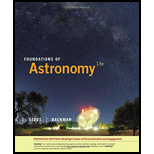
Foundations of Astronomy, Enhanced
13th Edition
ISBN: 9781305980686
Author: Michael A. Seeds; Dana Backman
Publisher: Cengage Learning US
expand_more
expand_more
format_list_bulleted
Concept explainers
Textbook Question
Chapter 26, Problem 25RQ
How does the stability of technological civilizations affect the probability that humanity can communicate with them?
Expert Solution & Answer
Want to see the full answer?
Check out a sample textbook solution
Students have asked these similar questions
2
3
Imagine you are out for a stroll on a sunny day when you encounter a lake. Unpolarized light from the sun is reflected off the lake into your eyes. However, you notice when you put on your vertically polarized sunglasses, the light reflected off the lake no longer reaches your eyes. What is the angle between the unpolarized light and the surface of the water, in degrees, measured from the horizontal? You may assume the index of refraction of air is nair=1 and the index of refraction of water is nwater=1.33 . Round your answer to three significant figures. Just enter the number, nothing else.
Chapter 26 Solutions
Foundations of Astronomy, Enhanced
Ch. 26 - Explain how astrobiology is a science and not a...Ch. 26 - Prob. 2RQCh. 26 - Prob. 3RQCh. 26 - How does the DNA molecule produce a copy of...Ch. 26 - What would happen to a life-form if the genetic...Ch. 26 - What would happen to a life-form if the genetic...Ch. 26 - What would happen to a life-form if the...Ch. 26 - Describe an example of natural selection acting on...Ch. 26 - Prob. 9RQCh. 26 - What evidence do scientists have that life on...
Ch. 26 - Prob. 11RQCh. 26 - Why is liquid water generally considered necessary...Ch. 26 - Prob. 13RQCh. 26 - What is the difference between chemical evolution...Ch. 26 - Prob. 15RQCh. 26 - Why was Earths early atmosphere able to support...Ch. 26 - Molecules of which gas were needed in Earths...Ch. 26 - Does intelligence make a creature more likely to...Ch. 26 - Prob. 19RQCh. 26 - Prob. 20RQCh. 26 - What is the evidence that the first organisms on...Ch. 26 - Name three locations in our Solar System to search...Ch. 26 - Why are upper-main-sequence (high-luminosity) host...Ch. 26 - Prob. 24RQCh. 26 - How does the stability of technological...Ch. 26 - Prob. 26RQCh. 26 - Prob. 27RQCh. 26 - Why are scientists confident Earth has never been...Ch. 26 - Why does the Drake equation implicitly assume the...Ch. 26 - Prob. 1DQCh. 26 - Prob. 2DQCh. 26 - Prob. 3DQCh. 26 - Prob. 4DQCh. 26 - Prob. 5DQCh. 26 - A single human cell encloses about 1.5 m of DNA....Ch. 26 - If you represent Earths history by a line that is...Ch. 26 - Consider Figure 25-8. What is the ratio of the...Ch. 26 - Suppose a human generation is defined as the...Ch. 26 - If a star must remain on the main sequence for at...Ch. 26 - Prob. 6PCh. 26 - If you detected radio signals with an average...Ch. 26 - Prob. 8PCh. 26 - The first radio broadcast was made on January 13,...Ch. 26 - Prob. 10PCh. 26 - Look at Figure 25-11. Since the time we sent the...Ch. 26 - The star cluster shown in this image contains a...Ch. 26 - If you could search for life in the galaxy shown...
Knowledge Booster
Learn more about
Need a deep-dive on the concept behind this application? Look no further. Learn more about this topic, physics and related others by exploring similar questions and additional content below.Similar questions
- 20. Two small conducting spheres are placed on top of insulating pads. The 3.7 × 10-10 C sphere is fixed whie the 3.0 × 107 C sphere, initially at rest, is free to move. The mass of each sphere is 0.09 kg. If the spheres are initially 0.10 m apart, how fast will the sphere be moving when they are 1.5 m apart?arrow_forwardpls help on allarrow_forwardpls help on thesearrow_forward
- pls help on all asked questions kindlyarrow_forwardpls help on all asked questions kindlyarrow_forward19. Mount Everest, Earth's highest mountain above sea level, has a peak of 8849 m above sea level. Assume that sea level defines the height of Earth's surface. (re = 6.38 × 106 m, ME = 5.98 × 1024 kg, G = 6.67 × 10 -11 Nm²/kg²) a. Calculate the strength of Earth's gravitational field at a point at the peak of Mount Everest. b. What is the ratio of the strength of Earth's gravitational field at a point 644416m below the surface of the Earth to a point at the top of Mount Everest? C. A tourist watching the sunrise on top of Mount Everest observes a satellite orbiting Earth at an altitude 3580 km above his position. Determine the speed of the satellite.arrow_forward
- pls help on allarrow_forwardpls help on allarrow_forward6. As the distance between two charges decreases, the magnitude of the electric potential energy of the two-charge system: a) Always increases b) Always decreases c) Increases if the charges have the same sign, decreases if they have the opposite signs d) Increases if the charges have the opposite sign, decreases if they have the same sign 7. To analyze the motion of an elastic collision between two charged particles we use conservation of & a) Energy, Velocity b) Momentum, Force c) Mass, Momentum d) Energy, Momentum e) Kinetic Energy, Potential Energyarrow_forward
arrow_back_ios
SEE MORE QUESTIONS
arrow_forward_ios
Recommended textbooks for you
 Foundations of Astronomy (MindTap Course List)PhysicsISBN:9781337399920Author:Michael A. Seeds, Dana BackmanPublisher:Cengage Learning
Foundations of Astronomy (MindTap Course List)PhysicsISBN:9781337399920Author:Michael A. Seeds, Dana BackmanPublisher:Cengage Learning Stars and Galaxies (MindTap Course List)PhysicsISBN:9781337399944Author:Michael A. SeedsPublisher:Cengage Learning
Stars and Galaxies (MindTap Course List)PhysicsISBN:9781337399944Author:Michael A. SeedsPublisher:Cengage Learning

 AstronomyPhysicsISBN:9781938168284Author:Andrew Fraknoi; David Morrison; Sidney C. WolffPublisher:OpenStax
AstronomyPhysicsISBN:9781938168284Author:Andrew Fraknoi; David Morrison; Sidney C. WolffPublisher:OpenStax Stars and GalaxiesPhysicsISBN:9781305120785Author:Michael A. Seeds, Dana BackmanPublisher:Cengage Learning
Stars and GalaxiesPhysicsISBN:9781305120785Author:Michael A. Seeds, Dana BackmanPublisher:Cengage Learning

Foundations of Astronomy (MindTap Course List)
Physics
ISBN:9781337399920
Author:Michael A. Seeds, Dana Backman
Publisher:Cengage Learning

Stars and Galaxies (MindTap Course List)
Physics
ISBN:9781337399944
Author:Michael A. Seeds
Publisher:Cengage Learning



Astronomy
Physics
ISBN:9781938168284
Author:Andrew Fraknoi; David Morrison; Sidney C. Wolff
Publisher:OpenStax

Stars and Galaxies
Physics
ISBN:9781305120785
Author:Michael A. Seeds, Dana Backman
Publisher:Cengage Learning
General Relativity: The Curvature of Spacetime; Author: Professor Dave Explains;https://www.youtube.com/watch?v=R7V3koyL7Mc;License: Standard YouTube License, CC-BY